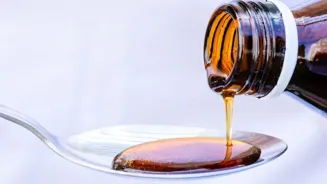What is DEG?
It's an industrial solvent — colourless, odourless, and deceptively sweet-tasting. It's used in brake fluids, paints, and lubricants, and is safe only in controlled industrial use. But if it contaminates other consumables, for example — pharmaceutical-grade ingredients, even in trace amounts, it becomes lethal — damaging the kidneys, liver, and nervous system.
As little as 1 ml per kilogram of body weight can be fatal. In case of adults, 50 to 100 ml can cause death, and for children, even a teaspoon can be fatal.
Also read | Cough syrup linked deaths: PIL seeks Supreme Court intervention as toll rises, MP bans 2 more drugs
The mortality rate ranges from 30% to 100%, depending on how quickly treatment begins.
While propylene glycol is safe and widely used in medicines, cosmetics, and food, ethylene glycol and diethylene glycol are industrial-grade chemicals and are lethal if consumed. As they look, taste, and behave similarly in manufacturing, DEG can slip in if the source material is adulterated — and that has resulted in repeated mass poisonings worldwide, said experts.
Experts highlight that substitution often happens due to cost-cutting, poor supplier oversight, and lax testing, especially among smaller manufacturers. A stark example — in Indonesia, the cough syrups made by Afi Farma in 2022 contained up to 96–99% ethylene glycol. The company did not test its inputs and relied solely on supplier certificates. As a result, several children died.
This is not the first such tragedy. In 2020, 12 children died in Jammu & Kashmir. In 2022, at least 66 in Gambia and 18 in Uzbekistan.
And now, the latest deaths in Madhya Pradesh and Rajasthan are reportedly linked to contaminated syrups.
Experts warned that unless India tightens raw material testing, ensures traceable supply chains, and enforces strict regulatory vigilance, toxic chemicals like DEG will continue to slip through, turning life-saving medicines into deadly poisons.














